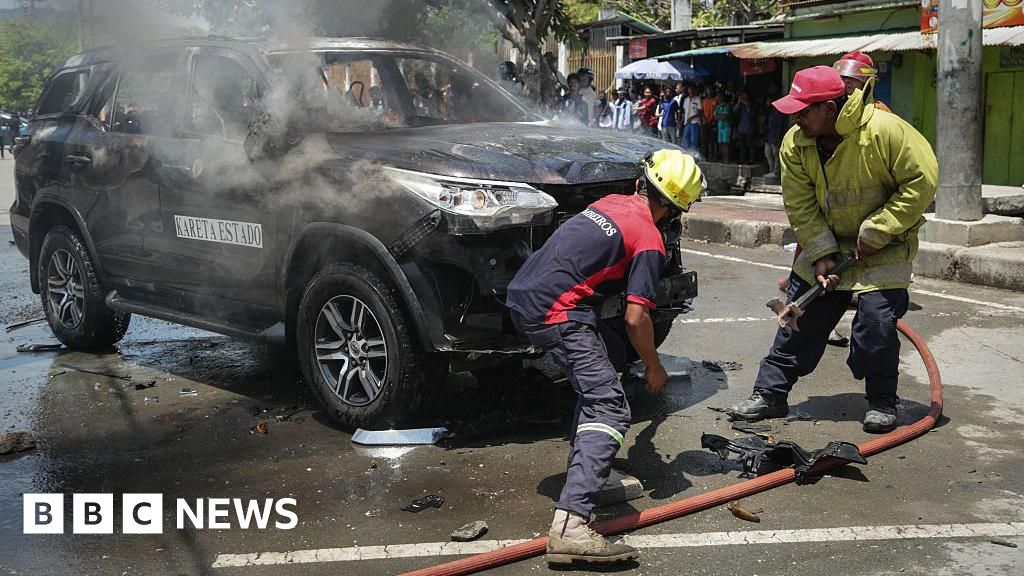
Timor-Leste scraps plan to buy MPs free cars after protests

Timor-Leste Abandons Controversial Plan for Free Cars for Lawmakers Amid Public Outcry
Timor-Leste has decided to abandon its controversial proposal to provide free vehicles for its lawmakers following widespread protests. The decision came after thousands of citizens took to the streets to express their discontent, leading to significant unrest in the capital, Dili.
Protests Erupt
On Tuesday, demonstrators engaged in acts of civil disobedience, including burning tires and setting a government vehicle ablaze. These actions prompted a police response that included the use of tear gas to disperse the crowds. In light of the public outcry, the government quickly reversed its decision to purchase new cars for members of parliament.
Despite the government’s concession, protests continued into Wednesday, with an estimated 2,000 individuals gathering in Dili to voice their frustrations. Initially ignited by the proposed vehicle purchase, the demonstrations have since expanded to encompass broader issues, including calls for the elimination of lifetime pensions for former lawmakers.
A Growing Movement
The protests in Timor-Leste are part of a larger trend of discontent among young people across Asia, who are increasingly vocal against perceived government excesses. Countries like Nepal and Indonesia have also experienced significant unrest fueled by similar grievances.
One anonymous student, who was caught in the chaos, recounted her experience of being struck by tear gas while protesting outside her university. She expressed her frustration towards lawmakers who sought luxury vehicles while many citizens struggle to make ends meet.
Economic Disparities
As of 2023, lawmakers in Timor-Leste earn an annual salary of $36,000, according to the Inter-Parliamentary Union. This figure is more than ten times the nation’s average income, which was estimated at around $3,000 in a government report from 2021. The stark disparity between the earnings of lawmakers and the average citizen has fueled public anger, particularly as the country grapples with high levels of inequality and unemployment.
Cezario Cesar, one of the protest leaders, noted that the pushback against free cars for lawmakers is not a new phenomenon. There have been ongoing demonstrations against such privileges since the early 2000s. In 2008, protests led to the arrest of several students who opposed a plan to spend $1 million on new vehicles for parliamentarians. However, this latest wave of protests has gained unprecedented momentum, reflecting a growing frustration with the government’s prioritization of lawmakers’ benefits over the needs of the general populace.
Unmet Needs
Cesar emphasized the pressing issues facing the country, stating, “People don’t have access to good education, water, and sanitation… we have a lack of facilities, but they’re still creating so many laws to benefit themselves.” He characterized the situation as one of injustice, highlighting the disconnect between the government and the citizens it serves.
Many lawmakers currently possess government-issued vehicles, and the proposal to purchase new Toyota Prado SUVs for each of the 65 members of parliament was met with skepticism. Following the protests, the parliament voted unanimously to abandon the vehicle purchase plan. Nevertheless, some citizens remain unconvinced, with rumors circulating that the cars were already on their way to the government.
Trinito Gaio, a 42-year-old protester, voiced his concerns, stating, “This is why all of these students and myself are here today, to make sure my tax money is not going in the wrong direction.” His comments reflect the broader sentiment among demonstrators, who are demanding accountability from their elected representatives.
A Young and Discontented Population
Timor-Leste boasts one of the youngest populations in Southeast Asia, with over 70% of its citizens under the age of 35, according to United Nations statistics. This demographic reality adds another layer to the ongoing protests, as younger generations seek to challenge the status quo and demand a more equitable distribution of resources.
Fidelis Leite Magalhães, a former minister and current president of the Institute of Politics and International Affairs in Timor-Leste, noted that the public is becoming increasingly accustomed to protests as a form of democratic expression. He remarked, “This is one of the biggest protests, but protests no longer induce panic in society.”
Regional Context
The unrest in Timor-Leste is not an isolated incident; it mirrors a wave of anti-government protests across Asia. Recently, in Nepal, large-scale demonstrations resulted in dozens of fatalities as youth protested against perceived nepotism and the political elite. Similarly, in Indonesia, protests erupted over cost-of-living issues and escalated after a tragic incident involving a police vehicle.
As Timor-Leste navigates these turbulent waters, it finds itself at a crossroads, where the voices of its citizens are demanding change and accountability from their leaders.
—
Key Facts
– Timor-Leste scrapped a plan to provide free cars for lawmakers after widespread protests.
– Protests began on Tuesday and continued into Wednesday, attracting around 2,000 demonstrators.
– Lawmakers in Timor-Leste earn an annual salary of $36,000, over ten times the national average income of $3,000.
– The protests have expanded to include calls for the removal of lifetime pensions for former lawmakers.
– Timor-Leste has one of the youngest populations in Southeast Asia, with over 70% under the age of 35.
Source: www.bbc.com

